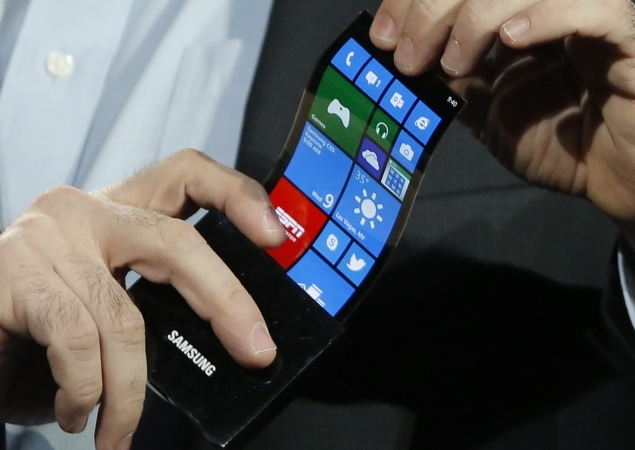- Home
- Others
- Others News
- Bendable, wearable phones and cameras closer to reality
Bendable, wearable phones and cameras closer to reality

The tiny power supply measures less than half a centimetre across and is made from a flexible material, to help develop lighter, smaller and thinner, mobile phones and cameras.
A bottleneck in making portable electronic devices like mobile phones even smaller is reducing the size and increasing the flexibility of the power supplies in electronic circuits, researchers said.
Supercapacitors are attractive power supplies because they can store almost as much energy as a battery, with the advantage of high-speed energy discharge.
Supercapacitor electrodes are normally made from carbon or conducting polymers, but these can be relatively costly.
A team led by Professor Oliver G Schmidt at the Leibniz Institute for Solid State and Materials Research in Dresden examined the use of manganese dioxide as an alternative electrode material, which is more environmentally friendly and less expensive than the standard materials.
Manganese dioxide is not a natural choice for an electrode material because it isn't very electrically conductive, nor is it naturally flexible or strong.
However, scientists overcame this by vaporising the manganese dioxide using an electron beam and then allowing the gaseous atoms to precipitate into thin, bendy films. They incorporated very thin layers of gold into the films to improve the electrical conductivity of the material.
Tests on the new micro-supercapacitor showed that the tiny, bendy power supply can store more energy and provide more power per unit volume than state-of-the-art supercapacitors, researchers said.
"Supercapacitors, as a new class of energy device, can store high energy and provide high power, bridging the gap between rechargeable batteries and conventional capacitors," Dr Chenglin Yan, leader of the research group, said.
"So we thought a micro-supercapacitor would be an important development in the rapid advance of portable consumer electronics, which need small lightweight, flexible micro-scale power sources," Yan said.
"The device could be applied to many miniaturised technologies, including implantable medical devices and active radio frequency identification (RFID) tags for self-powered miniaturised devices," said Yan.
The next step in the team's research is finding a cheaper alternative to gold to improve the conductivity of the micro-supercapacitor.
The study was published in the journal Energy & Environmental Science.
For the latest tech news and reviews, follow Gadgets 360 on X, Facebook, WhatsApp, Threads and Google News. For the latest videos on gadgets and tech, subscribe to our YouTube channel. If you want to know everything about top influencers, follow our in-house Who'sThat360 on Instagram and YouTube.
Related Stories
- Galaxy S24 Series
- MWC 2024
- Apple Vision Pro
- Oneplus 12
- iPhone 14
- Apple iPhone 15
- OnePlus Nord CE 3 Lite 5G
- iPhone 13
- Xiaomi 14 Pro
- Oppo Find N3
- Tecno Spark Go (2023)
- Realme V30
- Best Phones Under 25000
- Samsung Galaxy S24 Series
- Cryptocurrency
- iQoo 12
- Samsung Galaxy S24 Ultra
- Giottus
- Samsung Galaxy Z Flip 5
- Apple 'Scary Fast'
- Housefull 5
- GoPro Hero 12 Black Review
- Invincible Season 2
- JioGlass
- HD Ready TV
- Laptop Under 50000
- Smartwatch Under 10000
- Latest Mobile Phones
- Compare Phones
- Samsung Galaxy C55
- Blackview Hero 10
- Oppo K12
- Vivo Y200i
- Huawei Pura 70 Pro
- Huawei Pura 70
- Vivo V30e
- Itel Super Guru 4G
- Lenovo IdeaPad Pro 5i
- Asus ZenBook Duo 2024 (UX8406)
- Realme Pad 2 Wi-Fi
- Redmi Pad Pro
- boAt Storm Call 3
- Lava ProWatch Zn
- Samsung Samsung Neo QLED 8K Smart TV QN800D
- Samsung Neo QLED 4K Smart TV (QN90D)
- Sony PlayStation 5 Slim Digital Edition
- Sony PlayStation 5 Slim
- Voltas 1.5 Ton 3 Star Split AC (183 Vectra Elegant 4503545)
- Hitachi 1.5 Ton 5 Star Inverter Split AC (RAS.G518PCBISF)

















